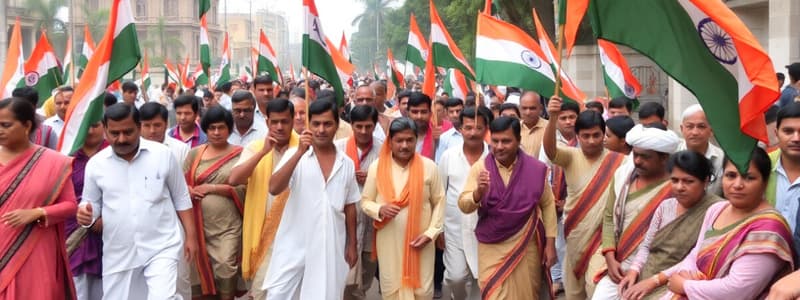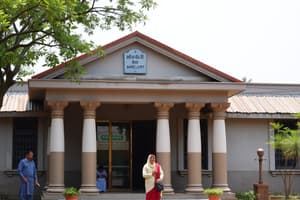Podcast
Questions and Answers
What is the main focus of the chapter titled 'The Indian Economy in the New Millennium'?
What is the main focus of the chapter titled 'The Indian Economy in the New Millennium'?
- The role of colonialism in shaping modern Indian agriculture
- The achievements of the political spectrum in India
- The historical events leading to India's independence
- The challenges faced by the Indian economy after 2000 (correct)
What significant events does the chapter 'Communalism and the Use of State Power' analyze?
What significant events does the chapter 'Communalism and the Use of State Power' analyze?
- The evolution of state power from 2000 to 2007
- The impact of foreign policy decisions on communal relations
- The Gujarat events and communalization of education (correct)
- The history of peasant movements in India since independence
Which chapter examines the relationship between colonial impact and agrarian movements in India?
Which chapter examines the relationship between colonial impact and agrarian movements in India?
- Run up to the New Millennium and After
- The Dawn of the New Millennium Achievements, Problems and Prospects
- The Indian Economy in the New Millennium
- Land Reforms: Colonial Impact and the Legacy of the National and Peasant Movements (correct)
What aspect does the chapter 'Run up to the New Millennium and After' address?
What aspect does the chapter 'Run up to the New Millennium and After' address?
How does the newly revised chapter assess the broader political economy of India since independence?
How does the newly revised chapter assess the broader political economy of India since independence?
What was the primary institution mentioned where many interactions and support were received?
What was the primary institution mentioned where many interactions and support were received?
Which foundation enabled Aditya Mukherjee and Mridula Mukherjee to be in Japan for a year?
Which foundation enabled Aditya Mukherjee and Mridula Mukherjee to be in Japan for a year?
What commemorative event coincides with the release of this contemporary history work?
What commemorative event coincides with the release of this contemporary history work?
During which year did the main authors complete a significant part of their drafting and research in Japan?
During which year did the main authors complete a significant part of their drafting and research in Japan?
Which of the following best describes the approach of the chapter 'The Dawn of the New Millennium Achievements, Problems and Prospects'?
Which of the following best describes the approach of the chapter 'The Dawn of the New Millennium Achievements, Problems and Prospects'?
Who is acknowledged as the Vice Chancellor that facilitated the opportunity for research in Japan?
Who is acknowledged as the Vice Chancellor that facilitated the opportunity for research in Japan?
What key theme is present in the newly added chapters regarding land reforms?
What key theme is present in the newly added chapters regarding land reforms?
What type of discussions did the authors mention having with their colleagues?
What type of discussions did the authors mention having with their colleagues?
How did the authors describe their interactions with a large number of colleagues and students?
How did the authors describe their interactions with a large number of colleagues and students?
Which of the following individuals was NOT mentioned as a colleague who contributed to the authors' understanding?
Which of the following individuals was NOT mentioned as a colleague who contributed to the authors' understanding?
What was a significant outcome of the authors' trip to Japan?
What was a significant outcome of the authors' trip to Japan?
What was the primary economic critique of colonialism initiated by Dadabhai Naoroji?
What was the primary economic critique of colonialism initiated by Dadabhai Naoroji?
Which leader became a significant ideologue of socialism in pre-1947 India?
Which leader became a significant ideologue of socialism in pre-1947 India?
What was the key objective of the national movement alongside the removal of poverty?
What was the key objective of the national movement alongside the removal of poverty?
Which reform was NOT part of the socialist agenda implemented during the national movement?
Which reform was NOT part of the socialist agenda implemented during the national movement?
What does 'land to the tiller' refer to in the context of socialist reforms?
What does 'land to the tiller' refer to in the context of socialist reforms?
In what way did socialist ideas influence the national movement?
In what way did socialist ideas influence the national movement?
Which of the following was emphasized by the national movement's socialist faction?
Which of the following was emphasized by the national movement's socialist faction?
What were workers’ rights linked to in the socialist reforms of the period?
What were workers’ rights linked to in the socialist reforms of the period?
What did the Karachi Resolution of 1931 emphasize as necessary for the end of mass exploitation?
What did the Karachi Resolution of 1931 emphasize as necessary for the end of mass exploitation?
Which statement reflects Gandhiji's view on land ownership expressed in 1942?
Which statement reflects Gandhiji's view on land ownership expressed in 1942?
What was one of the major political priorities of the national movement after 1920?
What was one of the major political priorities of the national movement after 1920?
How did the national movement influence the Constituent Assembly regarding Scheduled Castes and Scheduled Tribes?
How did the national movement influence the Constituent Assembly regarding Scheduled Castes and Scheduled Tribes?
What was the national movement's stance on secularism?
What was the national movement's stance on secularism?
Which of the following was a significant outcome of the national movement's advocacy for women's rights?
Which of the following was a significant outcome of the national movement's advocacy for women's rights?
In which decade did the national movement advocate for the total abolition of the caste system?
In which decade did the national movement advocate for the total abolition of the caste system?
What was the role of the national movement in the passage of the Hindu Code Bills in the 1950s?
What was the role of the national movement in the passage of the Hindu Code Bills in the 1950s?
What was the significance of Jawaharlal Nehru's statement regarding civil liberties in 1936?
What was the significance of Jawaharlal Nehru's statement regarding civil liberties in 1936?
Which fundamental rights were guaranteed by the resolution passed in the Karachi Congress in 1931?
Which fundamental rights were guaranteed by the resolution passed in the Karachi Congress in 1931?
How did the national movement influence the conception of democracy in India?
How did the national movement influence the conception of democracy in India?
Who defended the civil rights of the Extremist leader Tilak during the national movement?
Who defended the civil rights of the Extremist leader Tilak during the national movement?
What was the collective response to the Public Safety Bill and the Trade Disputes Bill in 1928?
What was the collective response to the Public Safety Bill and the Trade Disputes Bill in 1928?
What claim is made about India's historical readiness for democracy?
What claim is made about India's historical readiness for democracy?
What was a key argument against the colonial view of India's fitness for democracy?
What was a key argument against the colonial view of India's fitness for democracy?
What does the defense of civil liberties signify about political ideologies within the national movement?
What does the defense of civil liberties signify about political ideologies within the national movement?
Flashcards are hidden until you start studying
Study Notes
Indian Development Post-Independence
- This text discusses India's development post-independence, particularly in the context of the country's colonial past and the legacy of the national movement.
- The book's publication coincides with the 60th anniversary of India's independence, suggesting its relevance to understanding the ongoing issues of the time.
The Legacy of the National Movement
- The national movement played a critical role in shaping India's commitment to democracy, civil liberties, and social justice.
- The text highlights the movement's emphasis on discussion, debate, and persuasion for political and social change, contrasting this with the glorification of violence associated with authoritarianism.
- The movement's defense of civil liberties extended beyond its own ranks to encompass even those they were critical of, including Tilak and Bhagat Singh.
- This inclusive approach, along with the movement's anti-colonial stance, contributed to the emergence of a robust democratic culture within India.
Early Socialist Influences
- The text acknowledges the influence of socialist ideas within the national movement, particularly the removal of poverty as a key objective alongside ending colonialism.
- Leaders such as Jawaharlal Nehru, Subhas Chandra Bose, and Congress socialists actively promoted a socialist vision for India.
- However, despite this push, socialism didn't become the dominant ideology within the Congress, with Nehru acknowledging that the Congress hadn't fully embraced it as a primary goal.
Economic Reforms
- The national movement advocated for radical social and economic reforms, including:
- Compulsory and free primary education.
- Lowering taxes on the poor and lower middle classes.
- Debt relief and provision of cheap credit for farmers.
- Protection of tenants' rights and the abolition of landlordism.
- Workers' rights to a living wage and shorter working hours.
- Workers' and peasants' rights to organize.
Karachi Resolution and Gandhi's Land Statement
- The Karachi Resolution of the 1931 Congress declared "political freedom must include real economic freedom of the starving millions." highlighting the movement's commitment to ending exploitation.
- Gandhiji further heightened this radicalism in 1942 by stating that "the land belongs to those who work on it and to no one else."
Social Reforms
- The national movement's commitment to an egalitarian society extended to social reforms, particularly regarding gender and caste inequality.
- The movement brought millions of women into the political arena and championed their right to work, education, and political equality.
- The movement also prioritized the abolition of untouchability, although a strong anti-caste ideology didn't fully emerge.
Secularism
- The national movement was committed to secularism, defined as the separation of religion from politics and state neutrality toward all religions.
- This commitment included an active opposition to communalism.
Studying That Suits You
Use AI to generate personalized quizzes and flashcards to suit your learning preferences.




